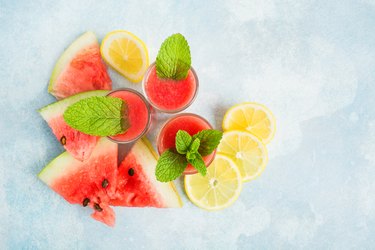
Making smart choices when it comes to your diet can be difficult. This process can become even more challenging when certain chronic and acute health conditions — such as bowel obstructions — occur. Individuals who have been diagnosed with a bowel obstruction will need to make significant changes to their diet.
Bowel Obstruction Basics
Video of the Day
A bowel obstruction is a partial — or complete — blockage of the bowel that can make the passage of intestinal contents difficult or even impossible. While a bowel obstruction can be caused by a number of factors, mechanical blockages are often to blame.
Video of the Day
Depending on the severity of the bowel obstruction, dietary recommendations may vary substantially. Individuals who get mild, moderate or severe symptoms of a bowel obstruction are generally encouraged to follow a partial bowel obstruction diet that may include a low-residue, minimal-residue or fluid-based diet, respectively. Residue includes fiber and other foods that may increase fecal output.
Low-Residue Diet
A low-residue diet may be best for those who have been diagnosed with a bowel obstruction and get bowel blockage symptoms such as occasional abdominal cramping, excess gas and bloating.
A low-residue diet is used to reduce the size or number of expelled stools, which can improve symptoms. Individuals who are on a low-residue diet should eat refined grains, soft or well-cooked fruits and vegetables, ground or well-cooked meats, and dairy products that are free from fruit or nuts.
Minimal-Residue Diet
A minimal-residue diet is used to decrease fecal output as much as possible and may be used as a "bridge" between fluid and low-residue diets. This type of diet will generally be recommended for those who regularly get bowel blockage symptoms such as abdominal pain, cramping and bloating that does not go away.
Individuals who are on a minimal-residue diet may drink clear, caffeinated or carbonated beverages and fruit juices and eat eggs, tender meat and certain white grains like pasta, bread, saltine crackers and strained oatmeal. At least one serving of citrus juice each day is recommended for individuals following a minimal-residue diet.
All Fluid Diet
Individuals who have been diagnosed with a bowel obstruction and get severe abdominal pain, heartburn, significant bloating, nausea and cramping may be encouraged to follow a fluid diet. As suggested by the name, fluid diets prohibit solid foods; they also provide little to no residue.
Those who follow a fluid diet may consume any milk-based beverages; refined, cooked cereals like farina; fruit and vegetable juice; broths or strained soups; pudding, custard, yogurt, and ice cream; and liquid nutritional supplements. Individuals who follow a fluid diet should work closely with a registered dietitian to ensure nutritional needs are met.
Food Choices To Prevent Blockages
It is seldom that your diet could have foods that cause bowel obstruction but there are some things you can do to help keep things moving and possibly reduce the chance of a blockage. Alberta Health Services offers suggestions on how you may prevent an intestinal blockage, including:
- Drink 8 to 10 cups of fluids daily. Limit caffeine, such as coffee, tea and colas,
and alcohol which can irritate the bowel
- Eat more canned, fresh or cooked vegetables and fruit with
seeds, membranes and skins removed. Avoid raw or stringy vegetables with tough
skins such as pea pods, celery and onions
- Limit intact grains such as nuts, seeds, granola, popcorn or
wild rice
- Avoid eating dried fruit such as raisins, dates and figs
- Chew foods well and eat slowly. Eat small amounts of food more often during the day
Is this an emergency? If you are experiencing serious medical symptoms, please see the National Library of Medicine’s list of signs you need emergency medical attention or call 911.